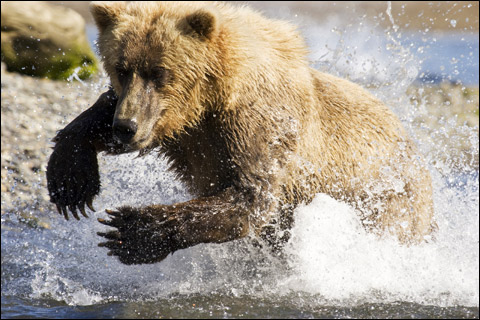
PITILESS: Life’s main topics are predation and, of course, “the urge to breed.” |
"Of the millions of known species of life on earth, more than 90 percent have no backbone." Well, that explains a few things. Also: "In life, there are no guarantees." How do I know this? Because Oprah told me. The rugged, maternal voice of Oprah, narrating the new four-disc DVD/Blu-ray set Life, from the BBC (also being rebroadcast Sunday nights at 8 on Animal Planet), keeps you on the hook. Full of husky confidences, apothegms, twists of storytelling, it is the voice of Nature. "The rainforest of western Belize, in Central America. Hundreds of different animal species live here. All must eat." (Cue footage of a fishing bat in slo-mo, wings silently woofing, clawed feet dragging the surface of a stream for high-riding minnows.)
Follow-up to the Emmy-winning series Planet Earth, the highest-selling documentary DVD ever, Life is all about survival: how plants do it, how animals do it. Here are three cheetahs lumbering their asses through the veldt, having not eaten for three and a half days. A giraffe purses its lips at them. A hysterical-looking ostrich hoists its skirts, begins to take evasive action — but, oh, ostrich, too late! One of the cheetahs is on your neck, another one is biting into your underneath, and though you get in a couple of good kicks with those dinosaur boots of yours, it's all over. A little ibex springs and scrapes down a Kenyan cliff face; the camera pulls back, emphasizing the creature's existential vulnerability, its solitude against the bare rock. And sure enough, there he is, fantastic Mr. Fox, his radar ears twisting and his isosceles triangle of a face pointing pointedly at the little ibex. A leap, a chase, some falling shale — this time the quarry gets away. Mr. Fox trips off unbothered. All in a day's work.
It's not all predation, of course. There's also what Oprah refers to delicately as "the urge to breed." On the misty freshwater lakes of Oregon, Western grebes mirror each other's moves in a mating dance, like Groucho and Harpo in Duck Soup. A giant Pacific octopus settles into the black crevice of her octopus's garden, where she'll stop eating for six months to nurse her hemorrhoid-like eggs, blowing jets of water over them until they pop, disgustingly.
Life is beautiful, if a little lacking in an overall thesis. Or maybe the overall thesis is just (to quote Steve Martin in Dirty Rotten Scoundrels): "Wow! Wow! All I can say is, wow!" On the ocean floor, things get psychedelic, sort of Kubla Khan–ish: "One and a half miles down, volcanic vents spew out superheated water." The music is wry twinkles of piano, pitter-patter percussion, plangent French horns, pizzicato strings, and the occasional sinister orchestral undertow — as when a pod of killer orcas, their blowholes chuffing like steam engines, zero in on a panicky seal. Around the globe we ricochet: "Eight hundred miles from the South Pole, an ice shelf in the shadow of smoldering Mount Erebus. . . . "; "Late summer on the Katmai coast of Alaska. . . . " Ethiopian wolves trot along in a pack and then fan out, each one looking for his lunch. A comical big-headed mole rat obtrudes his upper half from a hole. Look out, Moley! How on earth, and sometimes under it, did they manage to film all this? God knows — and you will too, if you watch the bonus material on Disc 4.